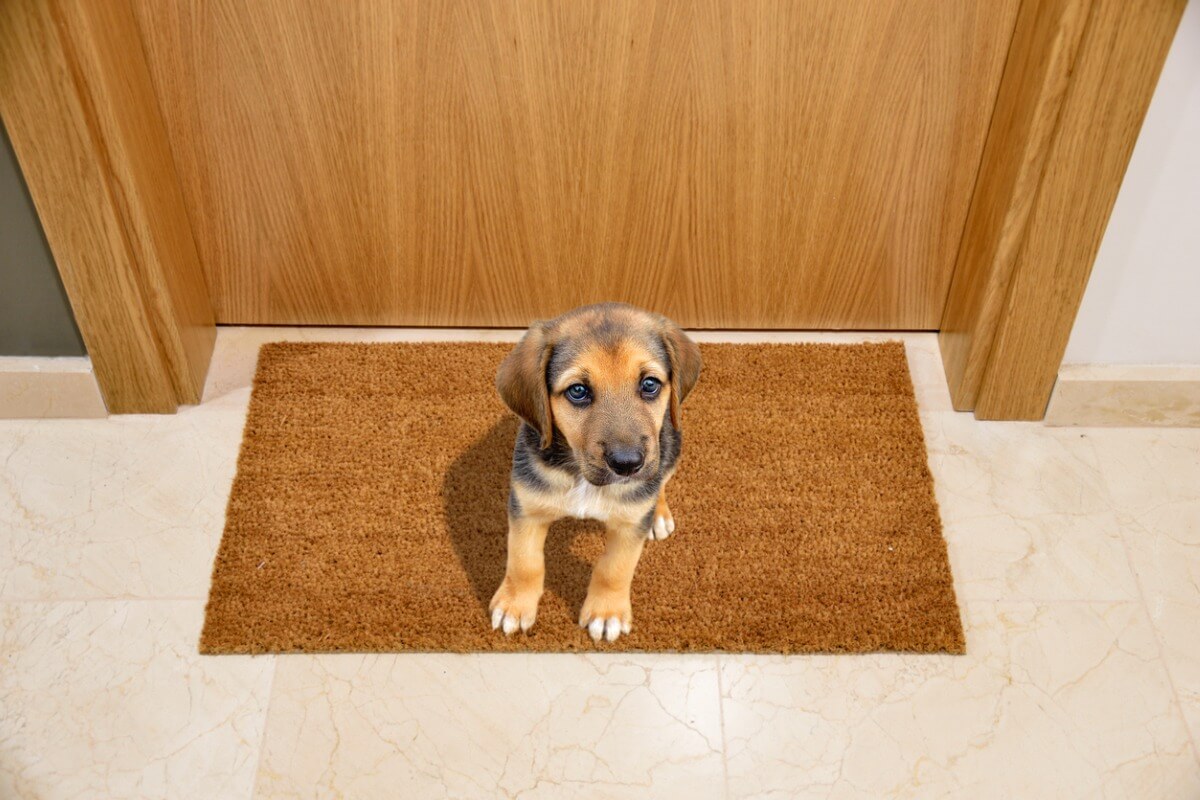Why Do Dogs Scratch at the Door?


Written and verified by the biologist Samuel Sanchez
The domestic canine has developed a specific language with human beings, as both species have coexisted together for about 27,000 years (even 40,000 according to some sources). Therefore, just by looking into the eyes of our furry friend, we can often understand what they want. One aspect of this communication is when dogs scratch at the door, but why exactly do they do this?
Despite the connection that humans have with this species, there are some behavioral aspects of dogs that continue to baffle us. For example: why does your dog constantly scratch at the door? This behavior, although it may seem adorable at first, can turn into a serious problem in the long run. Here’s why and how to put an end to it.
Why do dogs scratch at the door?
If your dog is outside, the answer to this question is simple: they’re tired of playing in the yard and want to come in. An adult dog can be left alone in a domestic environment for 6 hours (if they’re well behaved), but, after that time, they’ll start to get nervous and actively seek your attention.
On the other hand, your dog may scratch at the door from inside the home with obvious, and even excessive, urgency. Some reasons why this may occur are as follows:
- The dog needs to go out to relieve itself: It isn’t recommended that a dog stays at home for more than 6-8 hours at a time, because, after that time, it’ll need to urinate and defecate. Although this species can go for 10 hours without urinating and up to 48 hours without pooping, it isn’t recommended to wait that long to go for a walk.
- It has heard something or its sense of smell has detected something of interest: Dogs are capable of hearing things 4 times further away than humans and their sense of smell is 50 times more refined than ours. They may have heard something outside and wants to go out and explore – something that the owner hasn’t even noticed.
- They’re bored: Dogs tend to associate the outside of the home with a stimulating environment, both physically and mentally. If your dog is scratching at the door and it’s been a short time since their last walk, they may need a toy indoors or a little more attention from you.
- They want attention: If you call or yell at your dog when they scratch at the door, they’ll associate that action as a great way to get your attention. This behavior can be positively reinforced, even involuntarily.
While these are the main reasons why dogs scratch at the door, there are many more. If you suspect that this trait is pathological or indicative of another condition (e.g. stereotypies), we recommend that you see a canine ethologist as soon as possible.

Does your dog scratch the door at night?
If your dog stands in front of your bedroom door and scratches it while you sleep, it’s time to worry a little. While it’s normal for your dog to require outdoor stimulation during the day, neither is it normal for them to seek your attention all night long (even less so if they’re an adult dog).
Unfortunately, this behavior is often indicative of a disorder known as separation anxiety. This condition causes the dog to be overly attached to its owner, to the point of displaying destructive, self-injurious, and violent behavior when their human isn’t around. A dog with this pathology will experience real anxiety when alone.
Separation anxiety affects up to 17.2% of dogs, especially those who haven’t been properly socialized as puppies.
How to protect your door against this behavior
Now you know why dogs scratch at the door constantly. However, we still need to find out how to protect our doors! Here are a few methods that will help you do just that.
Install a “dog flap”
Dog “flaps”, doors or ramps are ideal for people who have an outdoor patio. These mechanisms, usually in the form of a trap door built into the door will allow your pet to leave and enter the house at will to go into the garden or patio, without having to get your attention every time they need to go out. Just make sure the animal has enough room to get through without getting stuck.
Obviously, these doors aren’t suitable for dogs living in cities without an outdoor yard.
Build a barrier
If there’s so yard or patio for your dog to go into, or you simply don’t want your dog going out of the house at will, then you can install a physical barrier to prevent the dog from reaching the door, while you seek to address the reasons for their behavior.
Baby fences (or child-proof gates) will do the job well, but you can also buy fences specifically for dogs. In any case, keep in mind that this is a temporary solution. Even if they can’t access the door, your dog will still be anxious, bored or stimulated by something outside, they’ll just channel it in a different way.
Establish a routine
If your dog scratches the door at certain times of the day, write them down in a notebook and see if they vary or not. Chances are your dog is doing this at specific times, just when they need to go to the toilet. If this is possible, we recommend that you adapt your routine to your dog’s needs.
Don’t pay attention to your dog when they do it
It can be very annoying when your dog scratches the door, even more so if they have large claws that can damage the door. The best thing to do in these cases is to ignore the animal when it carries out this behavior. This will stop it associating the activity with a reward, which, in this case, is to receive your attention immediately.
If you want this behavior to stop, don’t reward your dog or give them any attention until they get tired of scratching. Reward them only when they calm down, either with a cuddle, a canine treat or a trip outside. Positive reinforcement should be directed at stopping the activity, not the activity itself.

As you can see, there are many reasons why a dog may feel the need to scratch a door. There are also many solutions, but putting them into practice doesn’t always ensure success. If none of the above helps, we recommend that you consult a professional dog trainer. Your dog may have a disorder that needs to be treated.
The domestic canine has developed a specific language with human beings, as both species have coexisted together for about 27,000 years (even 40,000 according to some sources). Therefore, just by looking into the eyes of our furry friend, we can often understand what they want. One aspect of this communication is when dogs scratch at the door, but why exactly do they do this?
Despite the connection that humans have with this species, there are some behavioral aspects of dogs that continue to baffle us. For example: why does your dog constantly scratch at the door? This behavior, although it may seem adorable at first, can turn into a serious problem in the long run. Here’s why and how to put an end to it.
Why do dogs scratch at the door?
If your dog is outside, the answer to this question is simple: they’re tired of playing in the yard and want to come in. An adult dog can be left alone in a domestic environment for 6 hours (if they’re well behaved), but, after that time, they’ll start to get nervous and actively seek your attention.
On the other hand, your dog may scratch at the door from inside the home with obvious, and even excessive, urgency. Some reasons why this may occur are as follows:
- The dog needs to go out to relieve itself: It isn’t recommended that a dog stays at home for more than 6-8 hours at a time, because, after that time, it’ll need to urinate and defecate. Although this species can go for 10 hours without urinating and up to 48 hours without pooping, it isn’t recommended to wait that long to go for a walk.
- It has heard something or its sense of smell has detected something of interest: Dogs are capable of hearing things 4 times further away than humans and their sense of smell is 50 times more refined than ours. They may have heard something outside and wants to go out and explore – something that the owner hasn’t even noticed.
- They’re bored: Dogs tend to associate the outside of the home with a stimulating environment, both physically and mentally. If your dog is scratching at the door and it’s been a short time since their last walk, they may need a toy indoors or a little more attention from you.
- They want attention: If you call or yell at your dog when they scratch at the door, they’ll associate that action as a great way to get your attention. This behavior can be positively reinforced, even involuntarily.
While these are the main reasons why dogs scratch at the door, there are many more. If you suspect that this trait is pathological or indicative of another condition (e.g. stereotypies), we recommend that you see a canine ethologist as soon as possible.

Does your dog scratch the door at night?
If your dog stands in front of your bedroom door and scratches it while you sleep, it’s time to worry a little. While it’s normal for your dog to require outdoor stimulation during the day, neither is it normal for them to seek your attention all night long (even less so if they’re an adult dog).
Unfortunately, this behavior is often indicative of a disorder known as separation anxiety. This condition causes the dog to be overly attached to its owner, to the point of displaying destructive, self-injurious, and violent behavior when their human isn’t around. A dog with this pathology will experience real anxiety when alone.
Separation anxiety affects up to 17.2% of dogs, especially those who haven’t been properly socialized as puppies.
How to protect your door against this behavior
Now you know why dogs scratch at the door constantly. However, we still need to find out how to protect our doors! Here are a few methods that will help you do just that.
Install a “dog flap”
Dog “flaps”, doors or ramps are ideal for people who have an outdoor patio. These mechanisms, usually in the form of a trap door built into the door will allow your pet to leave and enter the house at will to go into the garden or patio, without having to get your attention every time they need to go out. Just make sure the animal has enough room to get through without getting stuck.
Obviously, these doors aren’t suitable for dogs living in cities without an outdoor yard.
Build a barrier
If there’s so yard or patio for your dog to go into, or you simply don’t want your dog going out of the house at will, then you can install a physical barrier to prevent the dog from reaching the door, while you seek to address the reasons for their behavior.
Baby fences (or child-proof gates) will do the job well, but you can also buy fences specifically for dogs. In any case, keep in mind that this is a temporary solution. Even if they can’t access the door, your dog will still be anxious, bored or stimulated by something outside, they’ll just channel it in a different way.
Establish a routine
If your dog scratches the door at certain times of the day, write them down in a notebook and see if they vary or not. Chances are your dog is doing this at specific times, just when they need to go to the toilet. If this is possible, we recommend that you adapt your routine to your dog’s needs.
Don’t pay attention to your dog when they do it
It can be very annoying when your dog scratches the door, even more so if they have large claws that can damage the door. The best thing to do in these cases is to ignore the animal when it carries out this behavior. This will stop it associating the activity with a reward, which, in this case, is to receive your attention immediately.
If you want this behavior to stop, don’t reward your dog or give them any attention until they get tired of scratching. Reward them only when they calm down, either with a cuddle, a canine treat or a trip outside. Positive reinforcement should be directed at stopping the activity, not the activity itself.

As you can see, there are many reasons why a dog may feel the need to scratch a door. There are also many solutions, but putting them into practice doesn’t always ensure success. If none of the above helps, we recommend that you consult a professional dog trainer. Your dog may have a disorder that needs to be treated.
All cited sources were thoroughly reviewed by our team to ensure their quality, reliability, currency, and validity. The bibliography of this article was considered reliable and of academic or scientific accuracy.
- Separation anxiety in dogs, VCA Hospitals. Recogido a 29 de noviembre en https://vcahospitals.com/know-your-pet/separation-anxiety-in-dogs#:~:text=Separation%20anxiety%20describes%20dogs%20that,when%20separated%20from%20the%20owners.
- How Do I Stop My Dog From Scratching The Door?, ClawGuard. Recogido a 29 de noviembre en https://clawguard.com/blogs/clawguard-blog/how-do-i-stop-my-dog-from-scratching-the-door
This text is provided for informational purposes only and does not replace consultation with a professional. If in doubt, consult your specialist.








